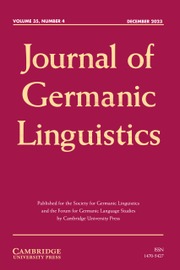Article contents
Communicative Styles in a Contact Situation: Two German National Varieties in a Third Country
Published online by Cambridge University Press: 11 August 2003
Abstract
This paper reports on a small-scale exploratory study of metapragmatic perceptions of apologies, directives, and modal particles in two national varieties of a pluricentric language in contact. It investigates the way in which Austrians and Germans (believe they) communicate in German when they are married to each other and living in an environment where the national language is not German, that is, where they do not need to converge toward the national variety of the wider community. The study finds that those informants of Austrian background tend toward negative politeness (Brown and Levinson 1987), focus more on blame and guilt, and engage more in the art of conversation. Those of German background tend more toward positive politeness and the verbal fulfillment of respectability. There is some evidence of convergence but a surprising amount of residual national variation in the realization of the speech acts. However, there is a limited use of modal particles and evidence of a weakening of intuition in relation to their use.We are indebted to the Australian Research Council for financial assistance for the project “Dynamics of Immigrant Language Contact,” and to Leslie Bodi and two anonymous reviewers for helpful suggestions.
- Type
- Research Article
- Information
- Copyright
- © 2003 Society for Germanic Linguistics
- 6
- Cited by


